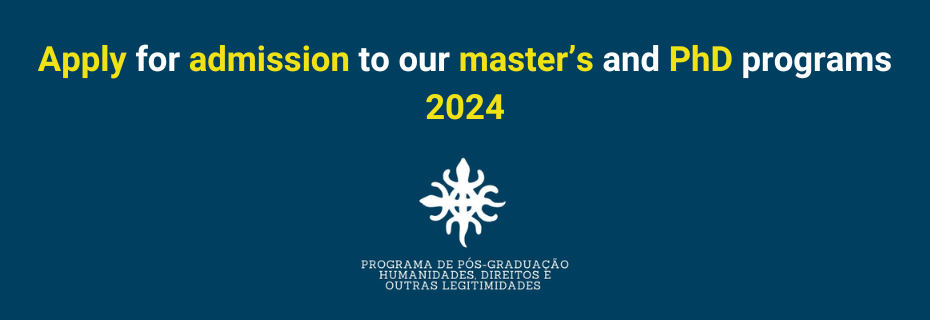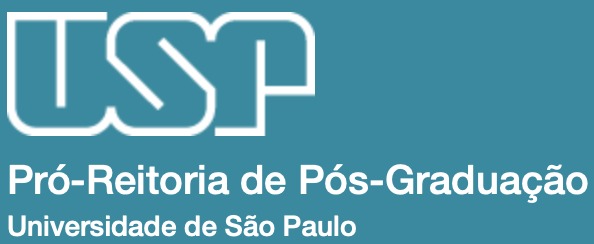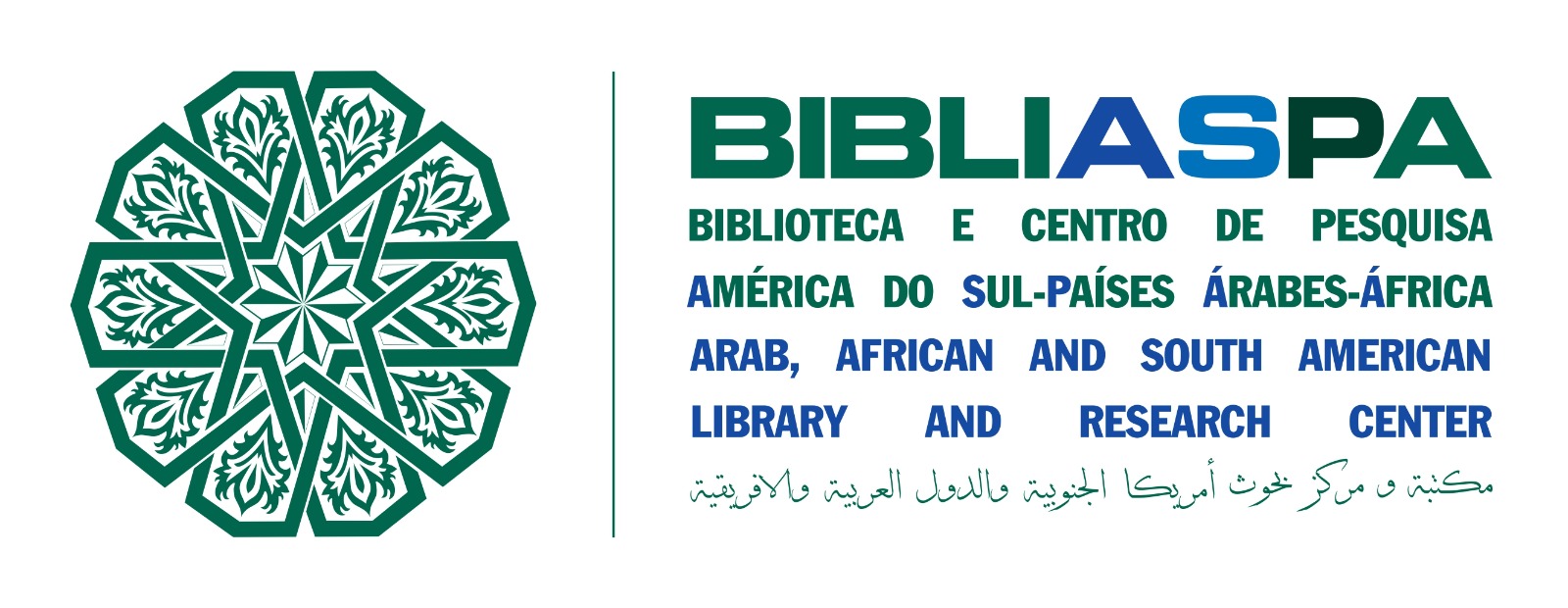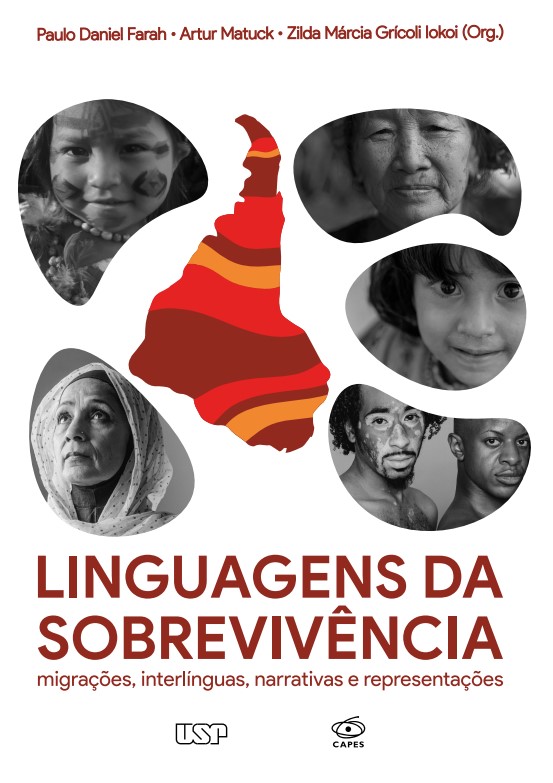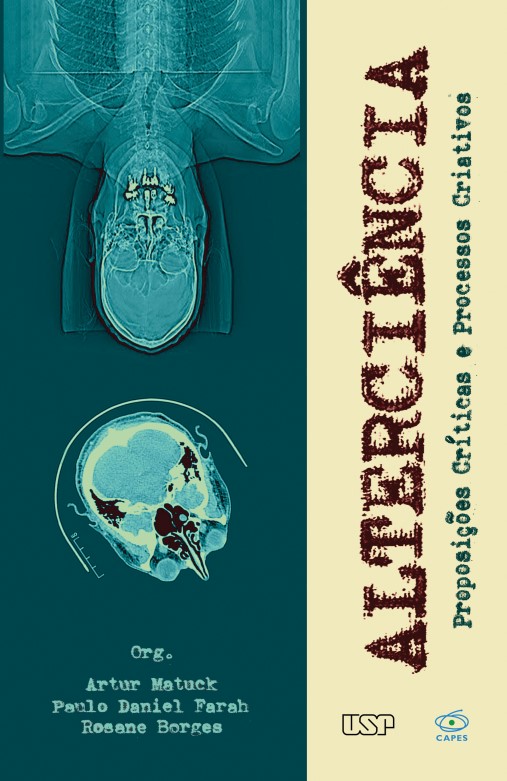I - COMPOSITION OF THE PROGRAM COORDINATING COMMITTEE (CCP)
The CCP will have as full members 10 (ten) full accredited advisors in the Program, one of them being the Coordinator and another the Coordinator's substitute, and 2 (two) student representatives, each full member having his or her substitute.
I.1 The election of CCP members and their respective substitutes will be made by the accredited advisors in the Program. The term of office for faculty members of the CCP will be two years, with re-election allowed.
I.2 The election of the Coordinator and his/her substitute will be made by the full members of the CCP or, in their absence, by their substitutes. The Coordinator and his/her alternate must be full members of the CCP with a two-year term of office that may be renewed.
I.3 The student representatives, full members and substitutes, elected by their peers, in a number corresponding to twenty percent of the total number of faculty members of the CCP, at least one of whom is a student, must be students regularly enrolled in the Program and not connected with the University faculty, with a one-year term of office, reelection being allowed.
II. SELECTION CRITERIA
II.1 Foreign language proficiency
Foreign language proficiency will be required during the selection process for the Master's Degree, Doctorate and Direct Doctorate, according to item V of these Regulations.
II.2 Requirements for the Master's degree
II.2.1 Admission to the Program will be by means of two tests:
Proficiency in a foreign language, as per item V of these Regulations, and a test of theoretical knowledge of the interdisciplinary area.
Students who pass the two tests will be summoned to a curriculum and research project evaluation session.
The final grade will be the arithmetic average of the grades of the exams, the resume and the project. Candidates who obtain a score of seven or more will be approved.
II.2.2 Registration documents:
Candidates must submit the following documents for enrollment in the selection process:
- Registration form (available on the program's webpage or at the graduate service);
- Copy of identification document;
- Lattes résumé;
- School transcript, student record, report card or equivalent document, containing any failures and withdrawals, issued by the undergraduate secretary, student section or equivalent;
- Submission of a research project to be developed in the course, according to FAPESP's model, in three copies.
II.3 Requirements for the Doctorate
II.3.1 The admission to the Program will be made by means of two tests:
Proficiency in a foreign language, according to item V of this Regulation, and a test of theoretical knowledge of the interdisciplinary area.
Students who pass the two tests will be summoned to a resume and project evaluation session.
The final grade will be the arithmetic mean between the grades of the exams, the resume and the project. Candidates who obtain a score of seven or more will be approved.
or higher will be approved.
II.3.2 Application documents
- Registration form (available on the program's web page or at the graduate service);
- Copy of identification document;
- Lattes Resumé;
- Academic transcript, student record, report card, or equivalent document, containing any failures and withdrawals, issued by the undergraduate secretary, student section, or equivalent official body.
- Proof of completion of a Master's degree strictu senso in the areas mentioned above.
- A transcript, student file, report card or equivalent document, containing any failures and withdrawals, issued by the graduate school office, student section, or equivalent official body.
- Submission of a research project to be developed in the course, according to the FAPESP model, in three copies.
II.4 Requirements for the Direct Doctorate
II.4.1. Admission to the Program will be through the presentation of a research project, the development of which presents empirical and theoretical results of significant parts of it, and three tests:
Proficiency in a foreign language, according to V of these Regulations, test of theoretical knowledge of the interdisciplinary area and written test of development of the central questions of the research project, with theoretical and bibliographic support, and the minimum score for approval in these last two tests is equal to 7.0 (seven).
Students who pass the three tests will be summoned to a resume and project evaluation session.
The final grade will be the arithmetic mean between the grades of the exams, the resume and the project. Candidates who obtain a grade higher than seven will be approved.
III.4.2 Registration documents:
Candidates must submit the following documents for enrollment in the selection process:
- Registration form (available on the program's webpage or at the graduate service);
- Copy of identification document;
- Lattes résumé;
- School transcript, student record, report card or equivalent document, containing any failures and withdrawals, issued by the undergraduate secretary, student section or equivalent.
- Submission of a research project to be developed in the course, according to the FAPESP model, in three copies.
III - DEADLINES
III.1 In the Master's course, the deadline for submitting the dissertation is 36 (thirty-six) months.
III.2 In the Doctorate course, for the holder of the Master's degree, the deadline for the thesis is 54 (fifty-four) months.
III.3 In the Doctorate course, without first obtaining the Master's degree (Direct Doctorate), the deadline for the thesis is 66 (sixty-six) months.
III.4 In any of the courses, in duly justified exceptional cases, students may request an extension for a maximum period of 120 (one hundred and twenty) days. The extension will be granted only to students who have completed the required totality of credits in courses and have passed the Qualifying Examination.
IV - MINIMUM CREDITS
IV.1 The Master's student must complete a minimum of credit units as follows:
- 96 (ninety-six) credit units, of which 24 (twenty-four) in discipline and 72 (seventy-two) in the dissertation.
IV.2 Doctoral students holding a Master's degree from USP or recognized by USP must complete a minimum of credit units, as follows:
- 168 (one hundred and sixty-eight) credit units, 08 of which in disciplines and 160 (one hundred and sixty) in the thesis.
IV.3 Doctoral students without a Master's degree must complete a minimum of credit units, as follows:
- 192 (one hundred and ninety-two) credit units, being 32 (thirty-two) in disciplines and 160 (one hundred and sixty) in the thesis.
A maximum of 12 (twelve) credits for the Master's course, 4 (four) credits for the Doctorate course, and 16 (sixteen) credits for the Direct Doctorate course may be granted as special credits. These credits are specified in item XVII - Other Rules of these regulations.
V- FOREIGN LANGUAGE
Students must demonstrate proficiency in a foreign language among German, Spanish, French, English, or Italian, one for the Master's degree and two for the Ph.
The evaluation of proficiency will be carried out by a committee appointed by the CCP, composed of at least two full professors from the Program or applied by an institution specialized in proficiency exams.
V.1 For both the Master's and the Doctorate other proficiency exams may be accepted, such as TOEFL, IELTS, Cambridge, Michigan, carried out up to 5 (five) years prior to the date of the student's enrollment in the proficiency exam applied by the Program.
The minimum score or concept for acceptance of the aforementioned exams will be announced in the Announcement of the Selection Process on the Program's website and in the Official Gazette of the State of São Paulo.
Other exams and respective minimum scores may be analyzed by the CCP upon student request.
V.2 For foreign students, in addition to proficiency in a language other than that of their country of origin, proficiency in Portuguese is also required, demonstrated through the presentation of the Certificate of Proficiency in Portuguese Language for Foreigners, CELPE-BRAS, intermediate level or higher or take the Portuguese language proficiency exam offered at the time of selection.
V.3 The foreign student who demonstrates Portuguese language proficiency in the Master's program will not be required to take the exam in the Doctoral program.
V.4 Applicants must demonstrate foreign language proficiency in the entrance exam.
VI - DISCIPLINES
VI.1 The accreditation or re-accreditation of courses is based on the analysis of the programmatic content, compatibility with the Program's research lines, bibliographic update, the teachers' Curriculum Vitae, and the detailed opinion of a rapporteur, after hearing the CCP;
VI.2 The Program's courses will be taught by three teachers from different areas of knowledge, who must participate fully in the course's activities.
VII. CANCELLATION OF COURSES
VII.1 Subject classes may be cancelled at the request of the lecturer, for reasons of force majeure, and approved by the CCP.
VII.2 The CCP will give its opinion on the request within a maximum period of 10 (ten) days.
Cancellation of a class for lack of students will only take place if there are fewer than 3 (three) regularly registered students, as requested by the person responsible for the discipline before the established start of classes.
VII.4 The maximum period for CCP deliberation according to the calendar is up to 2 (two) days before the final date for the start of classes.
VIII - QUALIFICATION EXAM (EQ)
The Qualifying Examination is required for both the Master's and Doctoral programs.
The registration for the qualifying exam is the student's responsibility and must be done within the maximum period established by the program in these Regulations (items VIII.1.1, VIII.2.1 and VIII.3.1).
The examination must be taken no later than sixty (60) days after the registration.
Graduate students who fail to take the exam within the period established for their course will be removed from the program, according to item V, article 52 of USP's Postgraduate Regulations.
The examining commission must be composed of three members, with a minimum doctoral degree, and their formation must be defined in these Regulations for each of the courses (master's or doctoral).
VIII.1 Master's Degree
VIII.1.1 Master's students must register for the examination within a maximum period of eighteen (18) months after their first enrollment in the course, according to the schedule established by the program and published on the program's web site.
VIII.1.2 The objective of the MA qualifying exam is to evaluate the knowledge acquired in disciplines and on the topic of the project, as well as the student's ability to execute the research project.
VIII.1.3 In the Master's program, the examination will consist of a representative monograph on the content of the research work, accompanied by an oral presentation.
VIII.1.4 The monograph must be submitted to the Program Secretariat in three copies at the time of registration.
VIII.1.5 The oral presentation, in a public session, will last a minimum of twenty and a maximum of thirty minutes, and will be followed by an examination by the Examining Committee, composed of the Advisor and two other PhDs, approved by the CCP. At this time the student may decide to move on to a Direct Doctorate.
VIII.2 Doctorate
VIII.2.1 The PhD student must register for the qualifying examination within a maximum period of twenty-seven (27) months after the beginning of the term in the course.
VIII.2.2 The objective of the qualification examination for the Ph.D. is to evaluate the candidate's capacity to independently develop a thesis project within his/her research area.
VIII.2.3 At the Ph.D. level, the examination will consist of a significant portion of the thesis accompanied by an oral presentation.
VIII.2.4 The contents of the qualifying exam will be on the work presented by the candidate.
VIII.2.5 The Qualification Report must be submitted to the Program Secretariat in three copies at the time of registration.
VIII.2.6 The Examining Committee will consist of the Advisor and two other members, approved by the CCP.
VIII.3 Direct Doctorate
VIII.3.1 The registration of candidates for the Direct Doctorate will be allowed in exceptional cases. When this possibility arises, the student must register for the qualifying exam within a maximum period of thirty-three (33) months after the beginning of the term in the course.
VIII.3.2 The objective of the qualification exam for the Direct Doctorate is the same as for the Doctorate with a Master's degree. The examination will be conducted according to the rules for the Doctorate.
VIII.4. failure in the Qualifying Examination (EQ)
VIII.4.1 Students who fail the qualifying exam can register to take it again only once, and must re-register within 3 (three) months after taking the first exam. The second exam must be taken within 60 (sixty) days after the registration.
If the student continues to fail the exam, he/she will be removed from the program and will receive a certificate for the courses taken.
IX - TRANSFERRING CONCENTRATION AREAS OR COURSES
IX.1 After passing the Qualifying Examination, and by suggestion of the examining board, the student may request a change of level, with the advisor's consent, within a maximum period of 30 (thirty) days. The CPG will analyze the request based on a detailed opinion issued by a rapporteur on the new research project and the student's academic performance.
IX.2 For the change of level, the deadlines for taking the qualifying exam, the proof of proficiency at a level compatible with the doctorate, as per item V of this regulation, and the minimum credits required for qualification in the new course must be verified. If this deadline has already been passed, if proficiency in a foreign language has not been proved, or if the minimum number of credits has not been met, the change will not be possible.
X - UNSATISFACTORY ACADEMIC AND SCIENTIFIC PERFORMANCE
X.1 In addition to the rules established in article 52 of USP's Postgraduate Regulations, the student may be dismissed from the graduate program, in any of the courses (Master's, Doctorate and Direct Doctorate), if one of the following situations occurs
a) reproach of the annual activities report for two consecutive times.
b) the annual report is not delivered by the deadline established in the calendar, which is published by the Graduate Studies Office and on the Program's webpage.
X.2 The student whose report is not approved must submit a new report within 30 (thirty) days, as of the approval of the rejection by CPG.
XI - SUPERVISORS AND CO-SUPERVISORS
XI.1 The decision on the accreditation of each advisor will be based on their scientific performance. The faculty member will be evaluated on his or her ability to conduct a research project and generate publications in refereed journals. Participation in conferences and post-doctoral internships will be considered. Coordination and participation in research projects will be valued.
XI.2 The Doctoral advisor must necessarily take on teaching activities in the Graduate Program in Humanities, Rights and other Legitimacies.
XI.3 For full accreditation, the professor must submit an updated Resumé Lattes, including at least one article published in a national and international refereed journal, or book or book chapter, in the last five years; demonstrate experience in mentoring, having oriented scientific initiation and at least one Master's degree.
XI.4 The program defines the articulation between advisors and co-supervisors. Each student will have one or two advisors according to the topic and specialty of the professors. Co-supervision will be decided upon when the student is approved for the course.
XI.5 The maximum term for the accreditation of co-supervisor in the Master's course will be 18 (eighteen) months.
XI.6 The maximum term for accreditation as co-supervisor in the PhD course will be 27 (twenty-seven) months.
XI.7 The maximum term for the accreditation of co-supervisor in the Ph.D. course will be 33 (thirty-three) months.
XI.8 The maximum number of advised students per advisor is 10 (ten). Additionally, a supervisor may co-supervise up to 3 (three) students.
XI.9. The advisor with full accreditation must apply for renewal of accreditation every 5 (five) years. For re-accreditation, the same criteria will be used as for full accreditation.
XI.10. The following aspects must be observed in the requests for accreditation of external advisors (Young Researcher, Postdoctoral Fellow, Visiting Professor, Trainee Researcher and others):
- Detailed justification from the applicant regarding the innovative contribution of the project to the graduate program;
- Identification of the bond of the interested party (e.g. young researcher), mentioning the duration of the program and line of research;
- To demonstrate the existence of infrastructure (physical, material and/or equipment);
- To demonstrate the existence of resources for financing the project proposed for the graduate student's orientation;
- A statement from a professor or supervisor of the institution, with the consent of the head of department or equivalent, showing agreement on the use of the space for the requested supervision and on maintaining the conditions for the execution of the graduate student's project;
- The applicant's curriculum vitae must include, if applicable, completed and ongoing orientations at USP and abroad;
- Demonstrate the functional situation and the institutional link of the interested party (if the interested party does not prove stable institutional link, the period of permanence in FFLCH must be of at least 75% of the maximum term for the deposit of the dissertation or thesis).
XII - PROCEDURES FOR THE DEPOSIT OF THE DISSERTATION/THESIS
XII.1 The final work in the Master's course will be in the form of a dissertation, containing the following items:
- Cover with name of the author, title of the work, place and date;
- Back Cover with name of the unit, author's name, work title, advisor's name and coadvisors, place and date;
- Table of Contents
- List of Figures, Illustrations, Equations and Tables, if applicable;
- Abstract in Portuguese;
- Abstract in English;
- Introduction;
- Parts or Chapters with their respective titles;
- Conclusions or Final Considerations;
- Bibliography;
- Annexes;
- Appendices
XII.2 The final work in the doctoral course will be in the form of a thesis, containing the following items:
- Cover with name of the author, title of the work, place and date;
- Back Cover with name of the unit, author's name, work title, advisor's name and co-supervisors, place and date;
- Summary;
- List of Figures, Illustrations, Equations and Tables, if applicable;
- Abstract in Portuguese
- Abstract in English;
- Introduction;
- Parts or Chapters with their respective titles;
- Conclusions or Final Considerations;
- Bibliography;
- Appendices;
- Appendices
XII.3 The deposit of the copies must be made by the candidate at the Postgraduate Office by the end of business hours of the last day of its term. For the Master's degree, 6 (six) printed copies of the dissertation, plus a copy of the dissertation in PDF format and its abstract in
DOC format in digital media. For the PhD, 8 (eight) copies of the thesis must be deposited, plus a copy of the thesis in PDF format and its abstract in DOC format in digital media.
The deposit must be accompanied by a letter from the advisor certifying that the student is ready for the defense.
XII.4 - In the Master's, Doctoral and Doctoral Law Examination Committees, the advisor will only chair the session, without the right to vote.
XIII - ADDITIONAL FORMS OF STUDENT EVALUATION
Students will be evaluated by their annual activity reports, according to item XVII.1 of these regulations.
XIV - WRITTEN EVALUATION WHEN JUDGING DISSERTATIONS OR THESES
Not applicable
XV - LANGUAGES ALLOWED FOR WRITING AND DEFENDING DISSERTATIONS AND THESES
XV.1 In accordance with article 89 of the University of São Paulo's Postgraduate Regulations, all Dissertations and Theses must contain the title, abstract and key words in Portuguese and English.
XV.2 Dissertations and Theses will be written and defended in Portuguese, and may exceptionally be written in a foreign language (German, Spanish, English, French and Italian) with a translation into Portuguese.
XVI - TITLE NOMENCLATURE
XVI.1 Master's degree students who fulfill all course requirements will be awarded the title "Master of Science". Program: Humanities, Rights and other Legitimacies.
XVI.2 The PhD or Directed Doctoral student who fulfills all course requirements will receive the title "Doctor of Science". Program: Humanities, Rights and other Legitimacies.
XVII - OTHER STANDARDS
XVII.1 Reports
XVII.1.1 Annual reports shall be submitted within the deadlines set by the CCP.
XVII.1.2. Reports will contain
- Title and Summary of the Research Project.
- Aims and Objectives
- Summary of activities described in previous reports (if applicable)
- Description of the activities carried out in the period, structure and content of what will be developed in the final text.
- Bibliographical References
- Complete Execution Schedule, identifying activities already done and future ones.
XVII.2 Special Credits
A maximum of twelve (12) credits for the Master's program, four (4) credits for the Doctorate program, and sixteen (16) credits for the Direct Doctorate program may be granted as special credits.
XVII.2.1 In the case of a full paper published in a national or international journal that has a recognized editorial board, or a book chapter of recognized merit in the field of knowledge, with the student as first author and that is related to the dissertation or thesis project, the number of special credits is equal to 2 (two).
XVII.2.2 Presentation of publications in annals, magazines, or academic vehicles during the master's period: the number of special credits is equal to 2 (two).
XVII.2.3 In the case of participation in the Teaching Enhancement Program (PAE) the number of special credits is equal to one.


